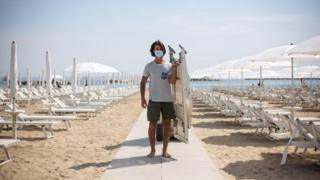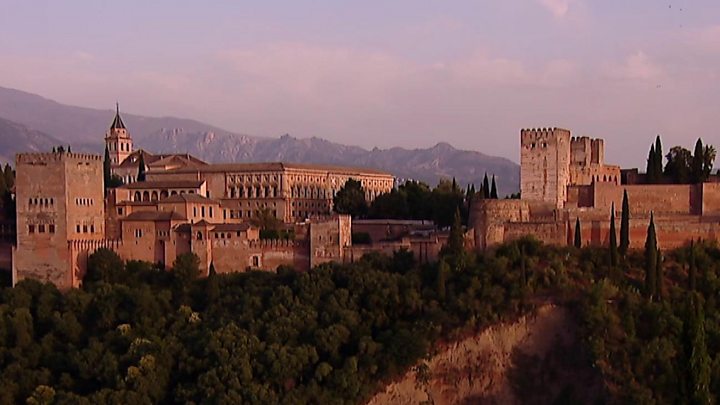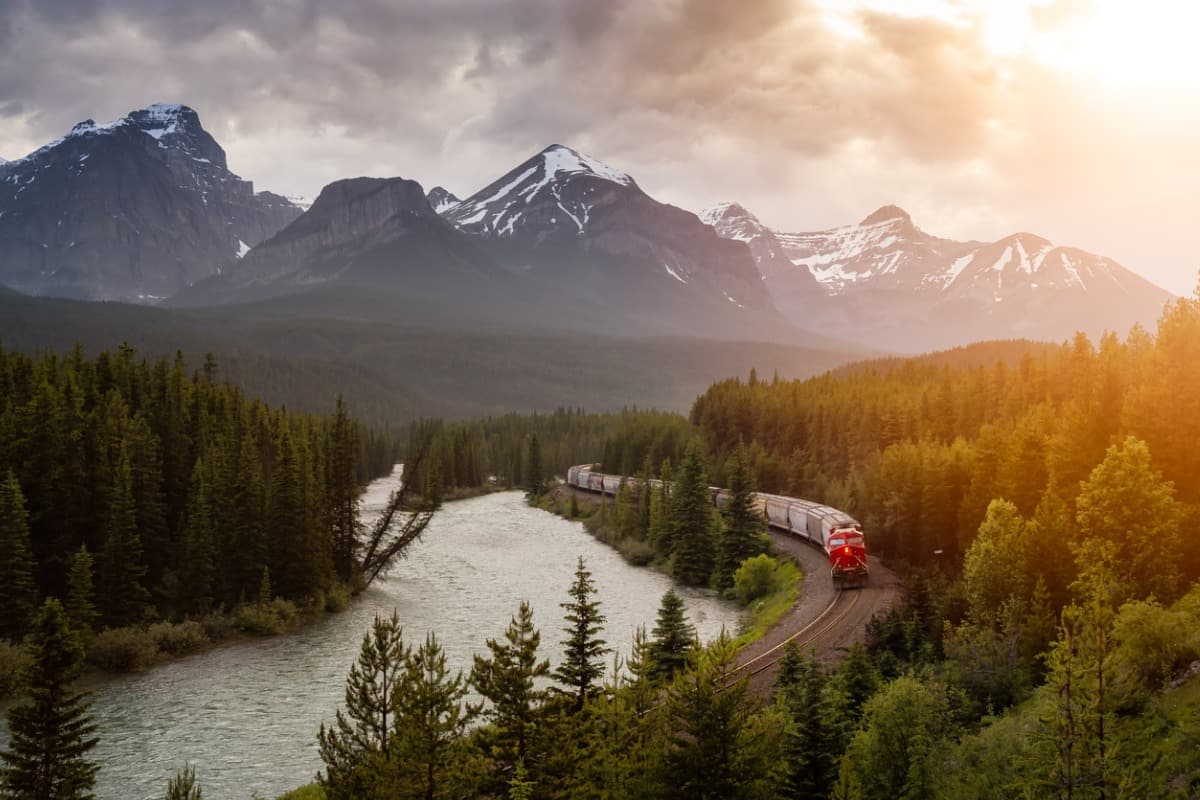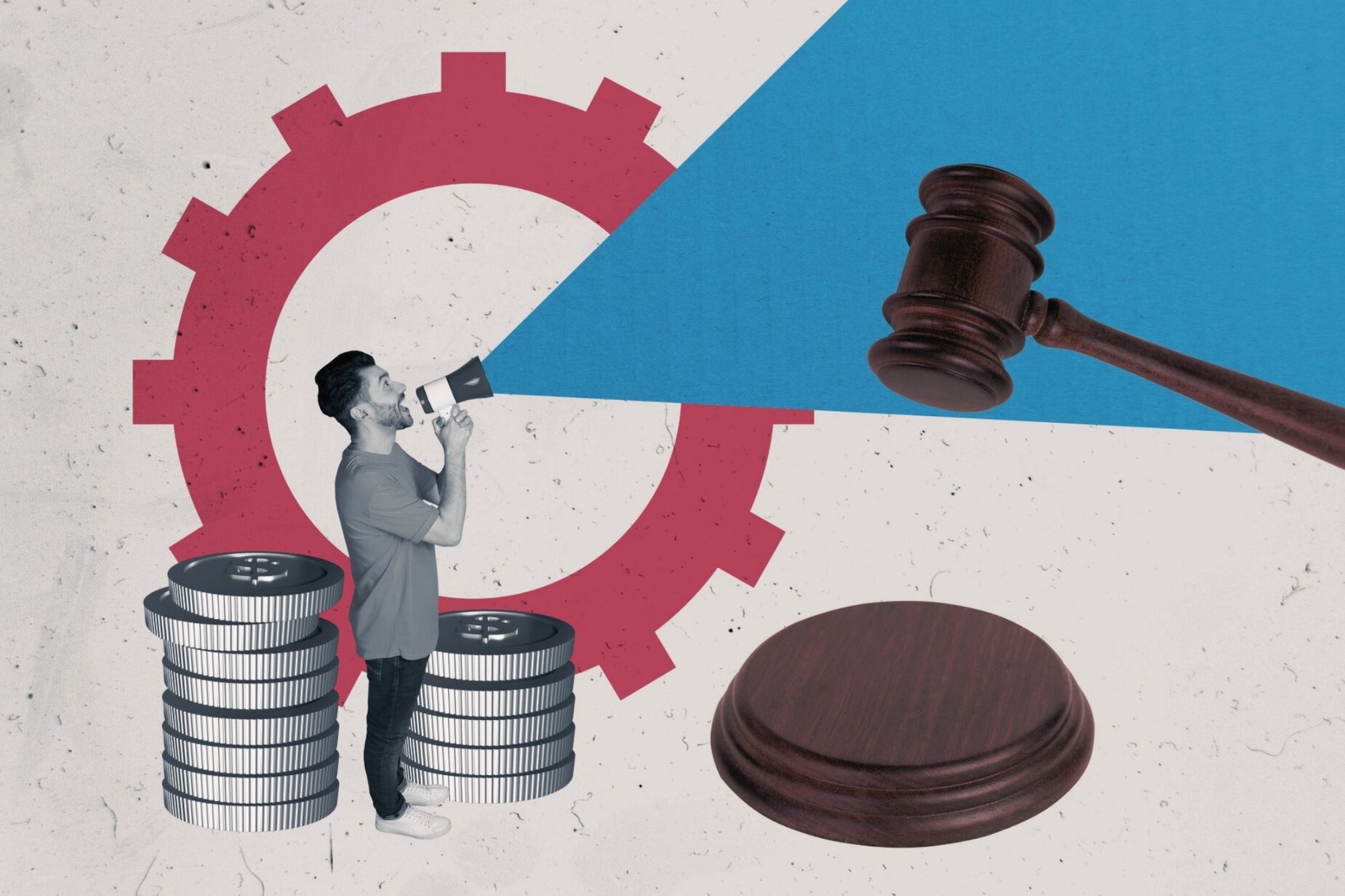 Image copyright
Image copyright
EPA
Beaches around Europe are preparing for an influx of holidaymakers
The prospect of a summer holiday abroad is on the cards again, after the UK government eased quarantine rules.
People returning to the UK from certain countries do not need to self-isolate. The full list of the countries that are exempt from the quarantine rule for England, Wales and Northern Ireland is here. For Scotland, the list is here – although the only difference is Spain.
For some of Britons’ most popular warm weather destinations, we’ve got details of what to expect when you’re there.
Spain – open for business
Need to quarantine on arrival? No
Need to quarantine when back in UK? No, if you’re returning to England, Wales or NI. Yes, if you’re returning to Scotland
Spain, including the Balearic Islands and the Canaries, is the most popular destination for Britons on their summer holidays, and 400,000 people from the UK own second homes in the country.
It’s had one of the strictest lockdowns in Europe, recording 28,355 coronavirus deaths up to the end of June. But it has now entered the “new normal” phase and its borders have reopened to tourists.
Image copyright
Reuters
Some beaches – like Cala Aiguablava Beach near Girona – are busier than others
What restrictions are still in place?
Visitors arriving from the UK will not be required to self-isolate – but you will have to undergo a temperature check.
People must stay 1.5m apart in public. Everyone aged six and over should wear face masks on public transport, in shops and in public spaces where it is not possible to follow the 1.5m distance rule.
However, different provinces in Spain can revert to previous stages of lockdown and introduce different measures – for example masks are compulsory everywhere including on beaches and swimming pools in Andalusia and the Balearic Islands.
Some areas have also reintroduced lockdowns after local outbreaks. Parts of Catalonia – which is the epicentre of most new outbreaks – are facing restrictions, including Barcelona where cinemas, theatres and nightclubs have closed. Restrictions have also been introduced in Galicia.
Where can you stay?
Image copyright
Reuters
German tourists are greeted by receptionists at a hotel in Ronda, southern Spain
Hotels and other accommodation such as campsites and hostels are open – but they are required to put in place capacity limits so all guests can stay 1.5m apart.
What tourist attractions are open?
In most of Spain, bars and restaurants are open but are only running at reduced capacity and must follow strict social distancing rules.
Exhibitions, theatres and cinemas have reopened but also at reduced capacity. Outdoor concerts of up to 400 people are allowed but with social distancing.
Nightclubs can also open although capacity is limited. To give an idea of what a night out is like, people have to provide contact details, wear masks and the dancefloor has become a seating area.
Visitors are able to go to the beaches, while most water parks, zoos, museums and theme parks have reopened or are planning to in July, although with reduced capacity.
Two of Spain’s most visited sites, Barcelona’s Sagrada Familia cathedral and the Alhambra Palace near Granada, have already welcomed back visitors.

Media playback is unsupported on your device
How can you get there?
The country is open to tourists entering by car, ferry, train or air. Travellers catching flights in must wear face masks, fill in a health card and undergo temperature checks.
Many major airlines are running flights including Ryanair, EasyJet and British Airways.
EasyJet has said it will be flying the majority of its routes this summer, and aims to have 75% of routes up and running by the end of August. Its website is taking bookings for July and August but prices vary widely, with many flights to Spain stretching to several hundred pounds.
France – gearing up for holiday season
Need to quarantine on arrival? No
Need to quarantine when back in UK? No
France is the second-most popular country for UK visitors, with around 17 million crossing the Channel every year, and 200,000 Britons have chosen it as the place for a second home.
It began to ease its strict lockdown on 11 May. President Emmanuel Macron declared on 14 June that France had won its “first victory” against the virus as he lifted more measures in the country, which had recorded nearly 30,000 coronavirus deaths by the end of June.
However, there are a rising number of cases in the north-west and in eastern regions, in particular in the north-western department of Mayenne.
Image copyright
Reuters
Tables and deckchairs are set out to respect social distancing on the Promenade des Anglais in Nice
What restrictions are still in place?
Travellers from the UK do not have to quarantine when they go to France.
People should remain 1m apart from others, and no more than 10 people may gather in any public space.
You also have to wear a mask in all enclosed public spaces. When travelling by train, you need to make a reservation in advance.
If arriving by Eurotunnel, travellers are being asked to fill out and carry with them a statement certifying that they do not have any coronavirus symptoms.
Where can you stay?
Hotels, gites, and campsites are now open to the public, as well as private rental accommodation.
Are tourist attractions open?
Image copyright
EPA
Disneyland Paris, one of Europe’s top visitor attractions, has reopened
Bars, restaurants and cafes are allowed to open inside and outside areas, but they have to follow strict hygiene rules. Customers are asked to wear a face covering when walking inside, but this can be removed when seated. No service is allowed at the bar and a distance of 1m is kept between tables.
There is a limit of 5,000 people for large venues and strict health rules apply for shows and cinemas. Nightclubs remain closed.
Beaches and parks have reopened, and you can now stay and sunbathe or have a picnic, and play non-contact sports. River cruises have been allowed since 11 July.
Museums, monuments, zoos and theme parks are gradually opening their doors again – but a mask is required to visit.
The Eiffel Tower started allowing visitors on 25 June. Disneyland Paris began a phased reopening on 15 July.
Some water parks have also set dates for when they will accept visitors again, with new rules in place. For example Aqualand, which has eight sites across the country, has advised visitors to arrive in their swimming costumes.
How can you get there?
It is once again possible to get to France by air, sea or train.
Eurotunnel has already attracted a record number of bookings over a weekend. Eurostar is operating a reduced service, with only direct trains to Paris. It will resume trains to Disneyland Paris on 2 August.
The major airlines, Ryanair, EasyJet and British Airways, all have flights to France this month, although at a lower frequency than normal.
A variety of routes across the Channel are on offer from ferry companies P&O, DFDS and Brittany Ferries.
Italy – welcoming British visitors
Need to quarantine on arrival? No
Need to quarantine when back in UK? No
The first European country to be hit hard by the virus, it is the third-most visited destination for UK travellers every year. Italy, which surpassed 34,000 virus-related deaths in June, imposed one of the strictest and earliest lockdowns on 7 March.
It reopened its borders on 3 June to travellers from other European countries, although the mayor of the island of Capri has complained that visitors haven’t been obeying the rules at its hotels and beaches.
Image copyright
Reuters
Attractions like the Colosseum in Rome are open for business again
What restrictions are still in place?
The country’s tourist board has released an extensive list of guidelines for visitors this summer.
In four regions – Sardinia, Sicily, Puglia and Calabria – tourists are required to register in advance.
People must stay 1m apart in public areas, including hotels and other communal spaces. Holidaymakers over the age of six will need to wear a mask at all times in public spaces indoors, and outdoors where social distancing isn’t possible (except in Lombardy where a mask outdoors is mandatory).
On public transport travellers will be required to wear masks, while temperature scanners may be in operation at train stations and airports.
Where can you stay?
Hotels, campsites, mountain huts and beach resorts have made arrangements to safely welcome visitors. However, an Italian hotel industry trade report said 60% had remained closed in June, while more than 20% are expected to still be shut in August.
Are tourist attractions open?
Image copyright
EPA
Tourists at the leaning Tower of Pisa have to wear face masks and an electronic device which sends out signals and sounds if anyone gets within 1m
Bars, cafes, restaurants and gelaterias reopened on 18 May, but they are hosting reduced numbers of diners, with tables further apart and plastic shields to separate customers.
Masks must be worn when you go inside and anytime you get up from your table. Many venues are asking customers to provide their name and contact details before using their services.
Parks and beaches have reopened, along with swimming pools, although the tourist board says you need to wear a swim cap in a pool.
Most museums, galleries and archaeological sites are open, but entry must be pre-booked online.
Capacity has been vastly reduced at some major tourist sites, like the Colosseum in Rome and the Uffizi gallery in Florence.
Other attractions are opening later this summer, such as Verona’s Roman amphitheatre which will hold its first event on 25 July.
Amusement parks, zoos, fun fairs and water parks are also open but entrance numbers may be limited.
How can you get there?
Airlines running flights include Ryanair, EasyJet and British Airways, although the number of destinations and flights is markedly reduced.
Ryanair and British Airways were operating flights to Rome in June, while EasyJet resumed flights there in July.
Greece – Britons now allowed
Need to quarantine on arrival? No
Need to quarantine when back in UK? No
Greece acted swiftly to impose lockdown in late February, and it was first eased in late April. At the end of June, it had a total of 3,409 confirmed cases and a death toll of 192, according to Johns Hopkins University.
Its tourism season officially began on 15 June and it has already opened its borders to some countries. But British travellers had to wait after a ban on flights from the UK was extended.
Since 15 July, British holidaymakers can now fly there, but they will be asked to take a test and self-isolate until they get a negative result (usually within 24 hours).
Image copyright
Getty Images
Greek islands like Santorini are a big draw for tourists
What restrictions are still in place?
People should aim to stay 1.5m apart and face masks must be worn on public transport – including flights and ferries – at airports, in lifts and in taxis. Masks are also strongly advised in other closed spaces.
Travelling in a car or taxi is limited to a maximum of two adult passengers as well as the driver, although children do not count towards the limit.
Image copyright
Reuters
Restaurants and cafes have been open for a while in Greece
Where can you stay?
All hotels, campsites and Airbnb accommodation are allowed to reopen.
Hotels can run at capacity but they have specific rules, including having a doctor on standby. Reception desks must also be moved outdoors where possible, and food served in buffets must be placed under protective acrylic screens known as sneeze guards. Read more on what Greek hotels might be like here.
What tourist attractions are open?
Shops, cafes, bars, restaurants and nightclubs are now able to reopen but with limits on capacity. No more than six adults can sit at a table together, although children are exempt.
Beaches and parks have also opened. Swimming pools can open but the number allowed in will depend on the size of the pool, while water slides may be shut.
Most tourist attractions, including museums, zoos, gardens and theme parks are up and running again, while archaeological sites such as the country’s world-renowned Acropolis in Athens have also reopened.
Image copyright
EPA
The Acropolis Museum in Athens reopened last month
How can you get there?
The major airlines are gradually reinstating flights to Greece this month, although they had to cancel some flights in the first half of July when the Greek government extended its travel ban for UK citizens.
For those nationalities allowed to enter, travel to the Greek islands is also possible, although passengers will need to complete a health questionnaire before boarding or take temperature checks.
Travel by yachts and private sailboats is now allowed. But cruise ships and ferries coming from other countries are banned from landing in Greek ports.
Portugal – open despite local outbreak
Need to quarantine on arrival? No, but travellers to Madeira and the Azores will be tested on entry
Need to quarantine when back in UK? Yes
Like Greece, Portugal has had fewer coronavirus cases and deaths than some other European nations.
After initially lifting restrictions, it later reintroduced some of the rules following local outbreaks in Lisbon. By the end of June, Portugal had recorded 1,576 deaths.
Travellers will face health screening when they arrive. Anyone going to Madeira or the Azores will need to take a test on arrival.
However, although Portugal’s border is open to British citizens, the UK government advises only going to Portugal if it’s essential – although trips to Madeira and the Azores can be non-essential.
Image copyright
Getty Images
British tourists usually flock to beaches like this one in the Algarve
What restrictions are still in place?
People must keep 2m away from others and there are capacity rules in shops and on public transport. Face masks are compulsory in enclosed spaces such as shops and outdoor gatherings.
Drinking alcohol in public places, except for pavement cafes and restaurants, is banned. Gatherings are limited to 20 people, except for religious ceremonies and family events, such as weddings and christenings.
In parts of Lisbon, a local lockdown has been extended until the end of July. In 19 areas, people must stay at home, while in Greater Lisbon gatherings are limited to 10 people and shops have to close at 8pm.
Where can you stay?
Tourism accommodation that meets the so-called “Clean and Safe” hygiene standard are allowed to open.
What tourist attractions are open?
Image copyright
Reuters
Portugal has recently seen a rise in new cases around Lisbon
Restaurants, cafes and bars are allowed to open with capacity rules and 1.5m distancing in place. Last orders are at 11pm. It is up to the local area whether markets will open.
Beaches are open but with measures in place to limit capacity and people must stay 1.5m apart. There is a mobile app to assess how full beaches are.
Water sports have also been given the green light.
Museums, art galleries, monuments, palaces and historic buildings have all reopened, as well as zoos.
How can you get there?
Many flight routes between the UK and Portugal have already resumed. Flights vary vastly in price, with a single Ryanair ticket from Manchester to Faro costing between £30 and £386 in July, although prices drop heading into August.
United States
Need to quarantine on arrival? Yes, but British nationals are not allowed in anyway
Need to quarantine when back in UK? Yes
Holidays to the US are still not a likely prospect. British nationals are not allowed to enter the USA if they have been in the UK (or a number of other countries) within the past two weeks.
Those who are eligible to enter the US – such as US citizens flying in from the UK – must be prepared to quarantine for 14 days. Even US travellers arriving from some US states must quarantine.
And, since the US is not exempt from the UK’s quarantine, anyone returning to the UK will have to self-isolate for 14 days. What’s more, the Foreign Office still advises against non-essential travel to the US.
The US has reported more than 3.4 million cases of coronavirus, and more than 136,000 deaths nationwide, according to Johns Hopkins University.
Image copyright
Getty Images
Disney has shut its resort in Hong Kong, but its Florida one is open
What restrictions are still in place?
Well, it varies state by state. You can check individual states’ rules here. A number of US states have now made face masks compulsory while in public.
Social distancing of 2m is recommended by the USA’s Center for Disease Control and Prevention.
Where can you stay?
Hotels are reopening across the country, the Foreign Office says, – but there will be local rules on capacity.
What tourist attractions are open?
Again, it depends on the state. Shops, restaurants, bars, beaches and other leisure activities are likely to be following local regulations.
California – a popular holiday destination for Britons – reintroduced sweeping restrictions on 13 July following a surge in cases. It ordered all indoor restaurants, bars, shopping malls and cinemas to close again.
Churches, gyms, shopping malls, zoos, museums, hair salons and non-essential offices must shut indoor operations in some of the state’s worst-affected counties, including Los Angeles.
Meanwhile, Florida – another popular destination – is fast becoming America’s latest Covid-19 epicentre. However, its Disney World resort reopened with limited capacity on 11 July.
Image copyright
EPA
Supermarket chain Walmart announced it would make all customers wear masks
How can you get there?
Some flights are running between the UK and US, but on a reduced schedule and at higher than usual prices.
What about elsewhere?
You can also return to the UK from these destinations without needing to isolate, as well as many others listed here.
Turkey: It reopened its borders to UK visitors on 12 June, and passengers are required to complete a form before arriving. Face masks are compulsory in crowded places and on public transport. In certain provinces, face masks are compulsory at all times outside the home. There remains an ongoing curfew for those aged over 65, those born after 1 January 2002, and those who have a chronic medical condition.
Croatia: Visitors from the UK must complete a form in advance and have proof of accommodation. Restaurants, accommodation and beaches are open, along with pools and aquaparks, although social distancing rules apply. Large public gatherings are allowed and nightclubs can also open. Passengers on public transport must wear masks.
Germany: The country is open to travellers from the UK, but people must keep a distance of 1.5m. Face masks are required in some public spaces but it varies by state. All shops, tourist accommodation and restaurants are open – but bars and cafes in some states are shut. One area was briefly put back into a local lockdown, but it has since been lifted.
Netherlands: UK visitors from Leicester are currently “strongly advised” to go into quarantine for 14 days on arrival. Tourists must reserve accommodation in advance. There is no maximum limit on the number of people allowed inside places including shops, museums and at outside venues like zoos and theme parks – provided people stick to 1.5m social distancing. Face masks are mandatory on public transport for anyone aged 13 and over. Nightclubs will not reopen before 1 September.
Belgium: Its borders are open to Britons. Everyone should keep 1.5m apart from others and people aged 12 and over should wear a masks on public transport. Restaurants, bars, cafes and shops are open but with strict rules, and tourist accommodation and activities can resume. Swimming pools are still closed.
Switzerland: No travel restrictions for UK travellers. Social distancing here is 2m. Most places are back open including shops, restaurants, bars and cafes are open with a limit of four customers per table and tables 2m apart. Passengers are advised to wear masks on public transport. In the Alps, mountain railways and cable cars are running.
Australia: Its borders are also closed to foreign nationals, and all travellers entering must undergo a 14-day quarantine. Travellers entering the UK from Australia do not have to self-isolate.
What information do we collect from this quiz? Privacy notice.
















